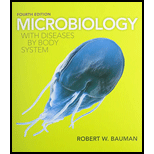
Microbiology with Diseases by Body System & Modified MasteringMicrobiology with Pearson eText -- ValuePack Access Card -- for Microbiology with Diseases by Body System Package
1st Edition
ISBN: 9780133857122
Author: Robert W. Bauman Ph.D.
Publisher: PEARSON
expand_more
expand_more
format_list_bulleted
Concept explainers
Question
Chapter 13, Problem 5SA
Summary Introduction
To answer:
The comparison between the budding cycle and lytic viruses in the host cell.
Introduction:
The viruses are obligate organisms that show signs of life only inside a host. Outside the host, they either die or do not show any sign of life. They invade the host cell to carry out their function like replication. A particular virus infects a particular host cell. The invaded host cell acts as machinery for the viruses.
Expert Solution & Answer
Want to see the full answer?
Check out a sample textbook solution
Students have asked these similar questions
Define host cell
Compare and contrast the latent and acute infections, with regard to the maximum amount of new virions produced.
During the lysogengiv cycle, the virus integrates its dna into the host cell?
true or false
Chapter 13 Solutions
Microbiology with Diseases by Body System & Modified MasteringMicrobiology with Pearson eText -- ValuePack Access Card -- for Microbiology with Diseases by Body System Package
Ch. 13 - Why are naked icosahedral viruses able to...Ch. 13 - What characteristics of the genomes of...Ch. 13 - Prob. 3TMWCh. 13 - Prob. 1EDCSCh. 13 - Prob. 4TMWCh. 13 - Prob. 5TMWCh. 13 - Prob. 6TMWCh. 13 - Prob. 7TMWCh. 13 - Prob. 1CCSCh. 13 - Prob. 1MC
Ch. 13 - Prob. 2MCCh. 13 - Prob. 3MCCh. 13 - Prob. 4MCCh. 13 - Prob. 5MCCh. 13 - Prob. 6MCCh. 13 - Prob. 7MCCh. 13 - Prob. 8MCCh. 13 - Prob. 9MCCh. 13 - Prob. 10MCCh. 13 - Prob. 1MCh. 13 - Prob. 1VICh. 13 - Prob. 2VICh. 13 - Prob. 1SACh. 13 - Prob. 2SACh. 13 - Prob. 3SACh. 13 - Prob. 4SACh. 13 - Prob. 5SACh. 13 - What is the difference between a virion and a...Ch. 13 - How is a provirus like a prophage? How is it...Ch. 13 - Prob. 8SACh. 13 - Prob. 9SACh. 13 - Prob. 10SACh. 13 - Prob. 1CTCh. 13 - Prob. 2CTCh. 13 - Prob. 3CTCh. 13 - Prob. 4CTCh. 13 - Prob. 5CTCh. 13 - Prob. 6CTCh. 13 - Prob. 7CTCh. 13 - Why has it been difficult to develop a complete...Ch. 13 - Prob. 9CTCh. 13 - What differences would you expect in the...Ch. 13 - Prob. 11CTCh. 13 - Prob. 12CTCh. 13 - Prob. 13CTCh. 13 - Prob. 1CM
Knowledge Booster
Learn more about
Need a deep-dive on the concept behind this application? Look no further. Learn more about this topic, biology and related others by exploring similar questions and additional content below.Similar questions
- Describe the steps in the production of multinucleate giant cellsduring a viral infection.arrow_forwardWhich is the usual order of a viral replication cycle when it is making new virions? O Host recognition > replication > entry > uncoating > release O Uncoating > host recognition > replication > entry > release O Prophase > metaphase > anaphase > telophase > cytokinesis Host recognition > entry > uncoating > replication > release MacBook Air DII DD F11 888 F8 F9 F7 F6 F5 F3 F4 & %24 % 7 8 LOarrow_forwardCompare and contrast the mechanism of replication of T4 vs. filamentous phages.arrow_forward
- Which of the following is a possible result of viral infection in eukaryotic host cells? O 1) Syncytialization of host cells. O 2) Inclusion bodies within the cytoplasm. O 3) oncogenesis. O 4) Host cell death 5) All of the abovearrow_forwardDescribe why the attachment step in a viral reproductive cycle isusually specific for one or just a few cell types.arrow_forwardExplain how a retrovirus, which has an RNA genome, is able to integrate its genetic material into that of a host having a DNA genome.arrow_forward
- Which of the following is characteristic of the lytic cycle? a) The virus-host relationship usually lasts for generations b) The viral genome replicates by destroying the host cell c) A single phage being released at a time d) Viral DNA is incorporated into the host genomearrow_forwarda. Which type of viruses can be directly used for translation? a) dsRNA b) Positive ssRNA c) Retroviruses d) Negative ssRNA b. An antiviral drug specifically modifies viral receptors on a eukaryotic host cell. How might this affect the viral reproductive cycle? It would enhance the process of viral apoptosis It would result in the degeneration of the viral capsid It would facilitate the process of viral endocytosis It would prevent the virus from attaching to the host cellarrow_forwardEmbryonated eggs are widely used for viral cultivation. Explainarrow_forward
- Describe two mechanisms a virus might use to prevent the induction of apoptosis in an infected cell.arrow_forwardDescribe the steps in a typical viral reproductive cycle, and explain how some viruses become latent.arrow_forwardWhich of the following are activities that a virus particle (a virion) cannot accomplish by itself? Select all that apply. a) Extract energy from food molecules b) Synthesis of capsid proteins c) Generate ATP d) Binding to a host cell e) Replication of the viral genomearrow_forward
arrow_back_ios
SEE MORE QUESTIONS
arrow_forward_ios
Recommended textbooks for you
 Biology (MindTap Course List)BiologyISBN:9781337392938Author:Eldra Solomon, Charles Martin, Diana W. Martin, Linda R. BergPublisher:Cengage Learning
Biology (MindTap Course List)BiologyISBN:9781337392938Author:Eldra Solomon, Charles Martin, Diana W. Martin, Linda R. BergPublisher:Cengage Learning

Biology (MindTap Course List)
Biology
ISBN:9781337392938
Author:Eldra Solomon, Charles Martin, Diana W. Martin, Linda R. Berg
Publisher:Cengage Learning